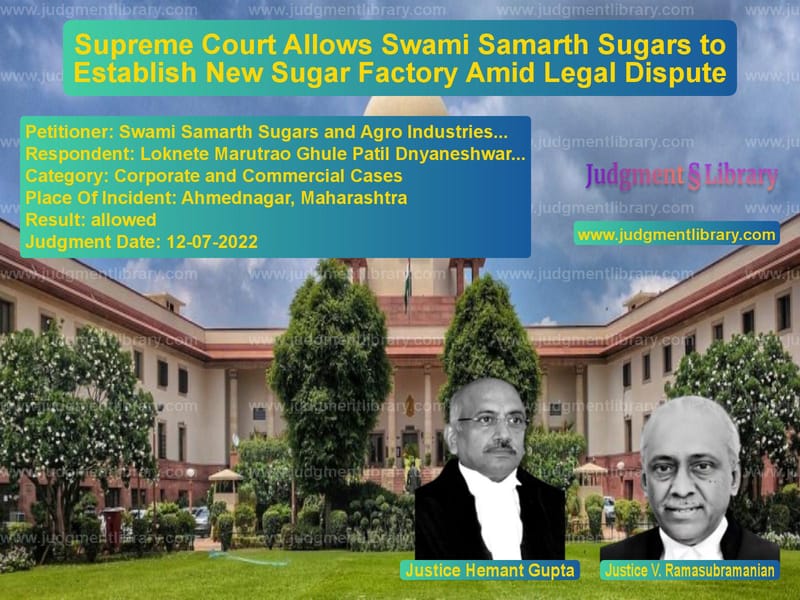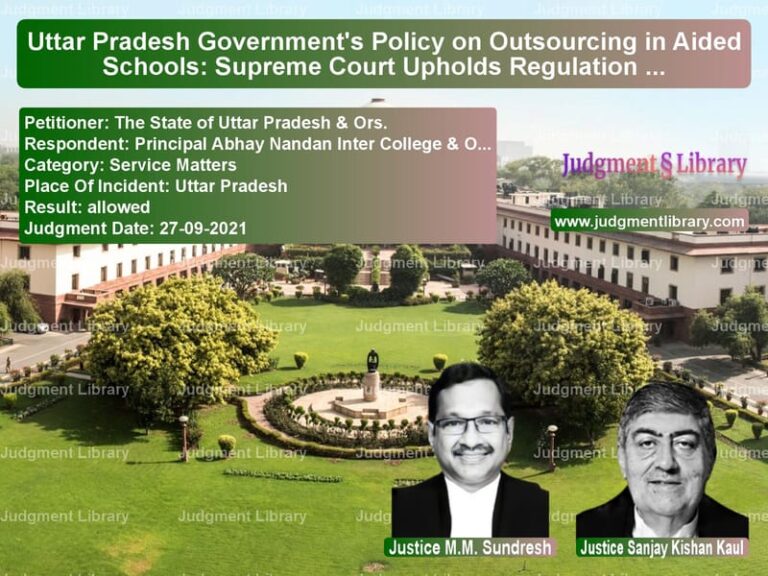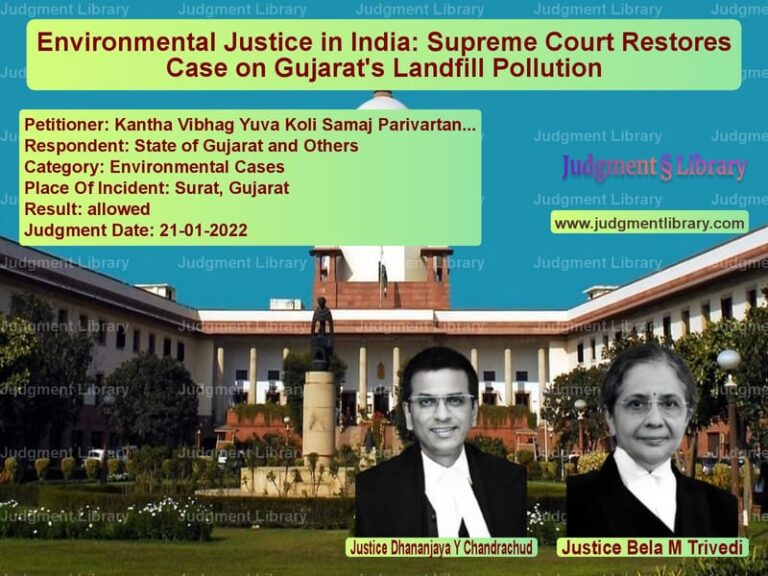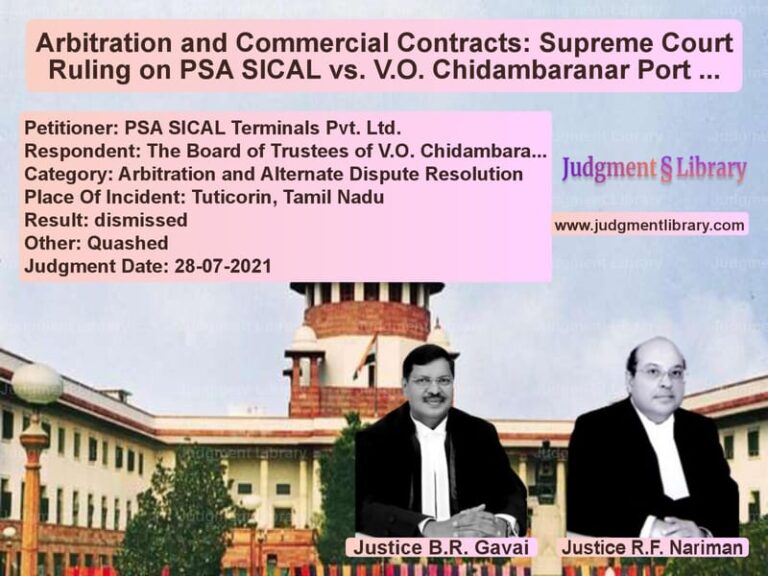Supreme Court Allows Swami Samarth Sugars to Establish New Sugar Factory Amid Legal Dispute
The Supreme Court’s decision in the case of Swami Samarth Sugars and Agro Industries Ltd. vs. Loknete Marutrao Ghule Patil Dnyaneshwar Sahakari Sakhar Karkhana Ltd. has significant implications for sugar industry regulations, particularly concerning the establishment of new sugar factories under the Sugarcane (Control) Order, 1966. The dispute revolved around the validity of an Industrial Entrepreneur Memorandum (IEM) granted to Swami Samarth Sugars for setting up a new sugar factory and whether the existing sugar factory could prevent its establishment based on regulatory distance norms.
Background of the Case
The conflict emerged when Swami Samarth Sugars was granted an IEM in 2010 for establishing a sugar factory in Ramdoh (Warkhed), Tehsil-Newasa, District-Ahmednagar. The existing sugar factory, Loknete Marutrao Ghule Patil Dnyaneshwar Sahakari Sakhar Karkhana Ltd., challenged this on the grounds that:
- The IEM was invalid as Swami Samarth Sugars had not taken effective steps to commence production within the prescribed 2+4 year period.
- The Maharashtra government had increased the minimum distance requirement for new sugar factories from 15 km to 25 km in 2011, making the new factory non-compliant.
- The Central Government’s extension of time for setting up the factory was contrary to the Sugarcane (Control) Order, 1966.
The case was initially heard by the Bombay High Court, which ruled in favor of the existing sugar factory, leading to the appeal before the Supreme Court.
Petitioner’s (Swami Samarth Sugars) Arguments
Swami Samarth Sugars argued that:
- The delay in commencing production was due to prolonged litigation and unforeseen circumstances beyond its control, including environmental and zoning restrictions.
- The minimum distance requirement of 15 km was in force at the time of granting the IEM, and subsequent changes to 25 km should not be applied retroactively.
- The Central Government had lawfully granted extensions considering the circumstances.
- The existing sugar factory was attempting to monopolize sugar production in the region by blocking competition.
Respondent’s (Existing Sugar Factory) Arguments
The existing sugar factory countered by asserting that:
- Swami Samarth Sugars had failed to take effective steps within the stipulated time, rendering the IEM invalid.
- The revised minimum distance rule of 25 km was binding and should be enforced.
- The Central Government’s extension of the IEM was illegal and violated the Sugarcane (Control) Order, 1966.
- The new factory’s establishment would cause unhealthy competition, leading to inefficiencies in sugarcane processing.
Supreme Court’s Observations
The Supreme Court, comprising Justices Hemant Gupta and V. Ramasubramanian, examined the facts and observed:
- The 2+4 year time limit for commencing production under the Sugarcane (Control) Order had been extended lawfully due to litigation and external factors preventing the appellant from proceeding with construction.
- The minimum distance rule of 15 km was applicable when the IEM was granted, and the subsequent revision to 25 km could not be applied retrospectively.
- Litigation initiated by third parties should not disadvantage the appellant, particularly when the disputes had been resolved in its favor.
- The Central Government’s authority to extend the IEM was legally sound.
Final Judgment
The Supreme Court ruled in favor of Swami Samarth Sugars, stating:
“The period spent in litigation shall be excluded while determining the period within which the plant had to be set up and commercial production commenced. The subsequent amendments to the Sugarcane (Control) Order shall not apply retrospectively to the appellant’s IEM.”
The High Court’s decision was set aside, allowing Swami Samarth Sugars to proceed with its factory.
Key Takeaways
- Regulatory Clarity: Changes in regulatory distance norms cannot be applied retroactively to already approved projects.
- Litigation Delays: Courts will consider litigation-related delays as valid grounds for extending project implementation deadlines.
- Prevention of Monopoly: Existing industrial entities cannot use legal challenges to block competition unfairly.
- Judicial Review of Government Decisions: Courts will uphold executive extensions if granted in accordance with statutory provisions.
Conclusion
The Supreme Court’s ruling in Swami Samarth Sugars vs. Loknete Marutrao Ghule Patil Dnyaneshwar Sahakari Sakhar Karkhana Ltd. reinforces the principle that industrial regulations cannot be retrospectively applied to penalize businesses. It also highlights the importance of fair competition in the sugar industry, ensuring that existing players cannot use legal technicalities to prevent new entrants. This judgment serves as an essential reference for industrial development cases involving regulatory changes and project implementation delays.
Petitioner Name: Swami Samarth Sugars and Agro Industries Ltd..Respondent Name: Loknete Marutrao Ghule Patil Dnyaneshwar Sahakari Sakhar Karkhana Ltd..Judgment By: Justice Hemant Gupta, Justice V. Ramasubramanian.Place Of Incident: Ahmednagar, Maharashtra.Judgment Date: 12-07-2022.
Don’t miss out on the full details! Download the complete judgment in PDF format below and gain valuable insights instantly!
Download Judgment: swami-samarth-sugars-vs-loknete-marutrao-ghu-supreme-court-of-india-judgment-dated-12-07-2022.pdf
Directly Download Judgment: Directly download this Judgment
See all petitions in Company Law
See all petitions in unfair trade practices
See all petitions in Bankruptcy and Insolvency
See all petitions in Corporate Compliance
See all petitions in Shareholder Disputes
See all petitions in Judgment by Hemant Gupta
See all petitions in Judgment by V. Ramasubramanian
See all petitions in allowed
See all petitions in supreme court of India judgments July 2022
See all petitions in 2022 judgments
See all posts in Corporate and Commercial Cases Category
See all allowed petitions in Corporate and Commercial Cases Category
See all Dismissed petitions in Corporate and Commercial Cases Category
See all partially allowed petitions in Corporate and Commercial Cases Category







